Benjamin Mkapa Stadium: Tanzania’s State of the Art Sports Facility
Benjamin Mkapa Stadium is a multi-purpose stadium located in Miburani ward of Temeke District in Dar es Salaam, Tanzania. It opened in 2007 and has since been a popular venue for major sports events, cultural festivals, and concerts. The stadium is named after Benjamin Mkapa, the third President of Tanzania, who served from 1995 to 2005.
With a seating capacity of 60,000, Benjamin Mkapa Stadium is the eleventh largest stadium in Africa. It was built adjacent to Uhuru Stadium, the former national stadium, and is owned by the government of Tanzania. The stadium was constructed by Beijing Construction Engineering Group and cost $56 million. The first derby between Young Africans S.C. and Simba S.C. filled the stadium to capacity in 2008, marking a major milestone in the history of Tanzanian sports.
Key Takeaways
- Benjamin Mkapa Stadium is a multi-purpose stadium located in Dar es Salaam, Tanzania, with a seating capacity of 60,000.
- The stadium was opened in 2007 and is named after Benjamin Mkapa, the third President of Tanzania.
- It is owned by the government of Tanzania and was constructed by Beijing Construction Engineering Group for $56 million.
Location and Accessibility
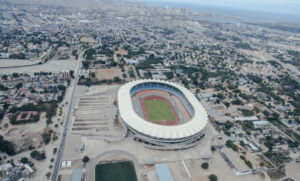
Benjamin Mkapa Stadium is located in Miburani ward of Temeke District in Dar es Salaam, Tanzania. The stadium is adjacent to Uhuru Stadium, the former national stadium. Its location in the bustling city of Dar es Salaam makes it easily accessible by public transportation, taxi or private car.
The stadium’s proximity to the city center and major roads makes it easy for fans to reach the stadium. The stadium is approximately 10 kilometers from Julius Nyerere International Airport, the main airport in Tanzania. Fans can take a taxi or public transportation to reach the stadium from the airport.
In addition, the stadium has a capacity of 60,000 seats and has five main entrances. The stadium has a 600-capacity car park, which makes it easy for fans to park their cars. The stadium also has a VIP lounge, which provides a comfortable and luxurious experience for VIPs attending events at the stadium.
Overall, the Benjamin Mkapa Stadium is easily accessible and well-located in the heart of Dar es Salaam, making it a convenient and popular destination for sports fans and event-goers.
History and Development
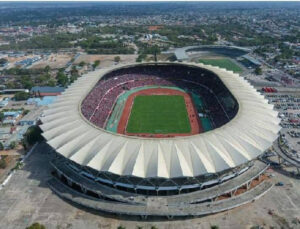
Construction
Benjamin Mkapa Stadium, also known as Tanzania National Main Stadium, is a multi-purpose stadium located in Miburani ward of Temeke District in Dar es Salaam, Tanzania. The stadium was constructed by the Beijing Construction Engineering Group at a cost of $56 million. The construction of the stadium began in the early 2000s, and it was completed in 2007. The stadium has a capacity of 60,000 seats, making it Africa’s eleventh largest stadium.
Inauguration
The Benjamin Mkapa Stadium was inaugurated in 2007, and it was built adjacent to Uhuru Stadium, the former national stadium. The first derby between Young Africans S.C. and Simba S.C. filled the stadium to capacity in 2008. Since then, the stadium has hosted major football matches such as the Tanzanian Premier League and home matches of the Tanzania national football team.
Renovations
In 2018, the government of Tanzania announced plans to renovate Benjamin Mkapa Stadium to meet international standards. The renovation project, which was estimated to cost $60 million, aimed to improve the stadium’s facilities and infrastructure. The project included the installation of modern lighting systems, new seats, and the construction of a new VIP section. The renovation was completed in 2020, and the stadium has since hosted several international football matches.
The Benjamin Mkapa Stadium is a significant landmark in Tanzania, and it has played a crucial role in promoting football in the country. The stadium’s modern facilities and infrastructure have made it a popular venue for international football matches and other sporting events.
Structure and Design
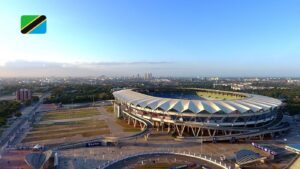
Seating Capacity
Benjamin Mkapa Stadium, also known as Tanzania National Main Stadium, is a multi-purpose stadium located in the Miburani ward of Temeke District in Dar es Salaam, Tanzania. The stadium has a seating capacity of 60,000, making it one of the largest stadiums in Africa and the biggest in Tanzania. The government of Tanzania owns the stadium, and it was built by Beijing Construction Engineering Group at a cost of $56 million.
Pitch and Field Dimensions
The stadium has a natural grass playing surface, and the pitch dimensions are 105 meters by 68 meters, which is the standard size for international football matches. The stadium also has a warm-up pitch and a training ground for the teams to prepare for matches. The playing field is surrounded by a running track, which is used for athletics events.
Lighting and Sound Systems
The lighting and sound systems at Benjamin Mkapa Stadium are state-of-the-art, ensuring that matches can be played at any time of the day or night. The stadium has a total of 320 floodlights, providing excellent illumination for the playing field. The sound system is also impressive, with 72 speakers strategically placed around the stadium to ensure that spectators can hear the commentary and music clearly.
In summary, Benjamin Mkapa Stadium is a modern and well-designed stadium that can host international football matches and other major events. Its seating capacity, pitch dimensions, and lighting and sound systems make it a world-class stadium that is capable of providing an excellent experience for both players and spectators.
Major Events
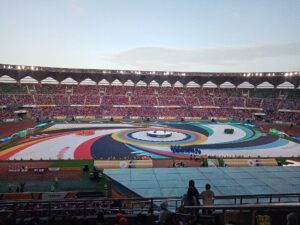
International Matches
Benjamin Mkapa Stadium has hosted several international matches, including the 2010 African Cup of Nations Qualifiers between Tanzania and Morocco, which ended in a 1-1 draw. The stadium also hosted the 2019 Africa Cup of Nations Qualifiers between Tanzania and Lesotho, which ended in a 1-0 victory for Tanzania.
National Tournaments
The stadium has been the venue for several national tournaments, including the Tanzanian Premier League and home matches of the Tanzania national football team. The stadium has also hosted the CECAFA Cup, a regional football tournament for East and Central African countries, multiple times.
Cultural Events
In addition to sporting events, Benjamin Mkapa Stadium has also hosted various cultural events. For instance, the stadium hosted the “Sauti za Busara” music festival in 2013, which featured artists from across Africa. The stadium has also been the venue for several political rallies and other public gatherings.
Overall, Benjamin Mkapa Stadium has played a significant role in hosting various events in Tanzania, ranging from international football matches to cultural festivals. Its location in Dar es Salaam, Tanzania’s largest city, makes it a popular choice for hosting events of all kinds.
Facilities and Services
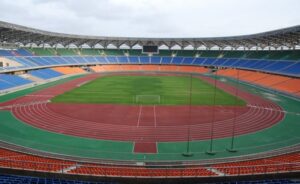
VIP Areas
Benjamin Mkapa Stadium boasts several VIP areas that offer guests an elevated experience. These areas include private boxes, VIP lounges, and a presidential suite. The private boxes can accommodate up to 10 people and offer a prime view of the field. The VIP lounges are spacious and comfortable, with air conditioning and a bar. The presidential suite is the most exclusive area in the stadium, providing a luxurious experience for up to 20 guests.
Concession Stands
There are numerous concession stands located throughout the stadium, offering a variety of food and drink options. These stands are strategically placed to ensure that guests can easily access refreshments without missing any of the action. The food options include local and international cuisine, and there are vegetarian and halal options available as well. The concession stands also offer a range of beverages, including soft drinks, beer, and wine.
Parking
Benjamin Mkapa Stadium has ample parking available for guests, with several parking lots located around the stadium. The parking lots are well-lit and secure, ensuring that guests can park their vehicles with peace of mind. The stadium also provides parking for VIP guests, with a designated VIP parking area located close to the stadium entrance.
Overall, Benjamin Mkapa Stadium provides guests with a comfortable and enjoyable experience, with a range of facilities and services designed to enhance their visit.
Economic Impact
Benjamin Mkapa Stadium has the potential to be a major stimulant of economic growth in Tanzania. The construction of the stadium itself has already created jobs and boosted the local economy. The stadium is also expected to attract tourists and generate revenue for local businesses.
The stadium is set to host major football matches such as the Tanzanian Premier League and home matches of the Tanzania national football team. These matches are expected to draw large crowds, which will create demand for food, accommodation, and transportation services. As a result, local businesses such as hotels, restaurants, and taxi services are expected to benefit from increased patronage.
In addition, the stadium is expected to host international events, which will bring in foreign visitors and generate revenue for the country. The government has already expressed interest in hosting major international events such as the Africa Cup of Nations (AFCON) at the Benjamin Mkapa Stadium. Hosting such events will not only generate revenue for the country but also boost Tanzania’s international profile.
Overall, the Benjamin Mkapa Stadium is expected to have a positive economic impact on Tanzania. The stadium will create jobs, boost the local economy, and generate revenue for local businesses. Additionally, hosting international events will enhance Tanzania’s international profile and help attract more tourists to the country.
Community and Cultural Significance
Benjamin Mkapa Stadium is more than just a sports arena; it holds a special place in the heart of the Tanzanian community. Located in the Miburani ward of Temeke District in Dar es Salaam, the stadium has become a symbol of national pride. Its prime location in the economic and cultural hub of Tanzania has made it an important landmark in the city.
The stadium is named after the late Benjamin Mkapa, who served as Tanzania’s third president from 1995 to 2005. As a result, the stadium has become a tribute to his legacy and the impact he had on the country. The government of Tanzania owns the stadium, and it was built at a cost of $56 million by the Beijing Construction Engineering Group.
The stadium’s cultural significance is further enhanced by its capacity to host large-scale events. With a seating capacity of 60,000, it is the largest stadium in Tanzania and one of the largest in Africa. The stadium has hosted major football matches such as the Tanzanian Premier League and home matches of the Tanzania national football team. It has also been the venue for concerts and other cultural events, making it an important part of the country’s cultural landscape.
Overall, Benjamin Mkapa Stadium is a testament to Tanzania’s aspirations for progress and prosperity. Its significance goes beyond sports and culture, as it represents the country’s journey towards a brighter future.
Sustainability Efforts
The Tanzania National Main Stadium, also known as Benjamin Mkapa Stadium, is making significant sustainability efforts to reduce its environmental impact. The stadium has installed solar panels that generate electricity to power the stadium’s floodlights, reducing the reliance on non-renewable energy sources. Additionally, the stadium has implemented a rainwater harvesting system that collects and stores rainwater for use in irrigation and cleaning.
The stadium management has also implemented waste management practices to reduce the amount of waste generated during events. The stadium has separate bins for different types of waste, including recyclables, organic waste, and non-recyclable waste. The recyclables are sent for recycling, while the organic waste is composted and used as fertilizer for the stadium’s landscaping.
Furthermore, the stadium has implemented measures to reduce water consumption. The stadium’s toilets have been fitted with low-flow fixtures that reduce water usage without compromising on performance. The stadium management has also implemented a water-efficient irrigation system that reduces water usage in the stadium’s landscaping.
Overall, the Tanzania National Main Stadium has made significant strides in reducing its environmental impact through sustainable practices. The stadium’s efforts serve as an example of how sports facilities can reduce their carbon footprint while providing world-class sporting experiences for fans.
Awards and Recognition
Since its opening in 2007, the Benjamin Mkapa Stadium has received numerous awards and recognition for its state-of-the-art facilities and contribution to the sports industry in Tanzania.
In 2019, the Tanzania Football Federation (TFF) awarded the stadium the “Best Stadium of the Year” award, recognizing its modern and well-maintained facilities. The stadium boasts a seating capacity of 60,000, making it one of the largest stadiums in Africa and the biggest in Tanzania. Its vast capacity allows for a thrilling atmosphere during major football matches, attracting fans from all over the country.
The stadium has also been recognized for its efforts in promoting sustainable development and environmental conservation. It has implemented various green initiatives, such as the use of solar panels for energy and rainwater harvesting for irrigation, reducing its carbon footprint and promoting a more eco-friendly environment.
Furthermore, the stadium has been praised for its contribution to the local economy and job creation. It has provided numerous employment opportunities for the local community, from construction workers to maintenance staff and security personnel.
Overall, the Benjamin Mkapa Stadium has become a symbol of excellence and innovation in the sports industry in Tanzania and has received recognition for its world-class facilities, sustainable initiatives, and contribution to the local economy.
Frequently Asked Questions
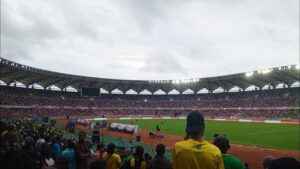
What is the seating capacity of the Benjamin Mkapa Stadium?
The Benjamin Mkapa Stadium has a seating capacity of 60,000 seats, making it Africa’s eleventh largest stadium. It is located in Miburani ward of Temeke District in Dar es Salaam, Tanzania. The stadium was built adjacent to Uhuru Stadium, the former national stadium.
What are the dimensions of the playing field at the Benjamin Mkapa Stadium?
The playing field at the Benjamin Mkapa Stadium measures 105 meters by 68 meters, which is the standard size for international football matches.
How can I find a seating plan for the Benjamin Mkapa Stadium?
Seating plans for the Benjamin Mkapa Stadium can be found on the official website of the Tanzania Football Federation. The seating plan provides information on the different seating categories and their corresponding prices.
Where can I purchase tickets for events at the Benjamin Mkapa Stadium?
Tickets for events at the Benjamin Mkapa Stadium can be purchased online through the official website of the Tanzania Football Federation or at the stadium box office on event days. It is recommended to purchase tickets in advance to avoid long queues on event days.
What was the construction cost for the Benjamin Mkapa Stadium?
The Benjamin Mkapa Stadium was built by Beijing Construction Engineering Group at a cost of $56 million. The government of Tanzania owns the stadium.
Are there any upcoming events scheduled at the Benjamin Mkapa National Stadium?
Events at the Benjamin Mkapa Stadium are scheduled by the Tanzania Football Federation. The official website of the Tanzania Football Federation provides information on upcoming events and their schedules. It is recommended to check the website regularly for updates on upcoming events.
Other Stadium Articles:
Check Out: Allianz Arena: The Architectural Marvel and Home of FC Bayern Munich
Check Out: Turf Moor: The Fortress and Historic Home of Burnley FC
Check Out: Etihad Stadium: Where Manchester City’s Dreams Take Flight
Check Out: Cricket’s Heartbeat in Johannesburg: Inside Bidvest Wanderers Stadium
Check Out: Where Champions Are Made: Exploring the Iconic Nelson Mandela Bay Stadium
Tags: Benjamin Mkapa Stadium, Benjamin Mkapa Stadium History and Development, Benjamin Mkapa Stadium Major Events, seating capacity of the Benjamin Mkapa Stadium?, Tanzania's State of the Art Sports Facility